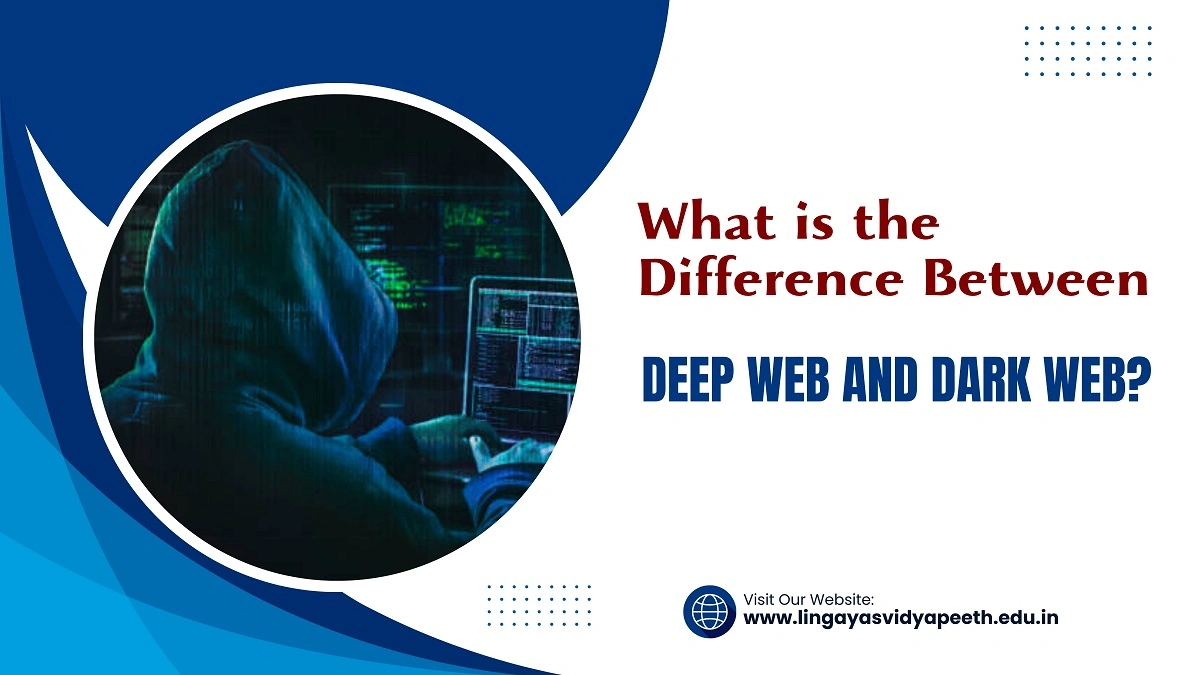Home » What is the Difference Between Deep Web and Dark Web?

Have you ever wondered what lies beyond the websites you visit every day, like Google, YouTube, or your favourite social media platforms? The internet is like an iceberg—what you see is just a tiny part of it! There’s a whole hidden world called the Deep Web and Dark Web. But what are they, and how are they different?
In this blog, we’re going to break it down in simple words so you can understand it easily. Additionally, we’ll guide you on how pursuing programs like BTech CSE, MTech CSE, BCA, or MCA at Lingaya’s Vidyapeeth can help you dive deeper into this digital world!
The Deep Web is all the stuff on the internet that you can’t find using regular search engines like Google or Bing. Think of it as the part of the internet that’s locked behind a door—you need the right key (like a password or special access) to get in.
To make it clearer, here are some everyday examples of the Deep Web:
At Lingaya’s Vidyapeeth, students in BTech CSE or BCA programs learn how to build secure systems like these, ensuring data stays private and safe on the Deep Web.
Here’s what makes the Deep Web special:
Studying MTech CSE or MCA at Lingaya’s Vidyapeeth teaches you how to secure Deep Web systems, preventing leaks and protecting user data.
Who uses the Deep Web? Pretty much everyone, even if you don’t realize it! Here are some examples:
The Dark Web is a tiny, hidden part of the Deep Web that you can only enter using special tools, like the Tor browser. It’s designed to keep users anonymous, which means no one can easily track who you are or where you’re from.
Here are some examples of what you might find on the Dark Web:
At Lingaya’s Vidyapeeth, BTech CSE and MCA students learn about cybersecurity, helping them understand how to navigate and secure networks like the Dark Web safely.
Courses like MTech CSE at Lingaya’s Vidyapeeth teach you how to protect against Dark Web threats, like malware or data breaches.
To make it super clear, here’s a table comparing the Deep Web and Dark Web:
| Feature | Deep Web | Dark Web |
| Size | About 96% of the internet | Only 0.01% of the Deep Web |
| Access | Regular browsers (Chrome, Firefox) with login | Special browsers like Tor or I2P |
| Indexing | Not indexed by search engines | Not indexed and hidden intentionally |
| Content | Mostly legal (emails, bank accounts) | Mix of legal and illegal content |
| Anonymity | Not anonymous, just private | Highly anonymous using encryption |
| Examples | School portals, JSTOR, Netflix | .onion sites, anonymous forums |
| Ease of Use | Easy with credentials | Hard, needs specific tools and URLs |
| Purpose | Secure data storage, research, communication | Anonymity, bypassing censorship, some illegal |
| Risks | Data leaks if poorly secured | Malware, scams, illegal activity |
| Users | Students, professionals, everyday people | Privacy advocates, journalists, criminals |
The regular web (or Surface Web) is what you use every day—Google, YouTube, social media. Here’s why the Deep Web and Dark Web are different:
Want to dive deeper into the world of the internet and cybersecurity? Lingaya’s Vidyapeeth, a top-rated university in Delhi NCR approved by UGC, AICTE, and accredited by NAAC, offers programs that prepare you for a tech-driven future. Here’s how their courses can help:
With specializations like AI&ML, Data Science and Cybersecurity you’ll get hands-on training in labs and learn from experienced faculty members. Whether you want to secure bank databases or fight cybercrime, Lingaya’s equips you with the skills to succeed. It’s super affordable too ranging from INR 35,000 to 80,000 per semester (depending on the course)
The Deep Web and Dark Web might sound mysterious, but they’re just parts of the internet with different purposes. The Deep Web keeps your private data safe, like your grades or bank account, while the Dark Web offers anonymity, which can be used for good or bad. If you’re excited about exploring tech and building a career in cybersecurity or app development, Lingaya’s Vidyapeeth is the place to start. Our BTech CSE, MTech CSE, BCA, and MCA programs are your perfect fit.
Also Read
Software engineering courses after 12th
Data science courses after 12th
B.tech in cyber security
Technical courses after 12th
From
Lingaya’s Vidyapeeth
Best College in Faridabad
RECENT POSTS
CATEGORIES
TAGS
Agriculture Agriculture future AI Architecture artificial intelligence Bachelor of Commerce BA English BA Psychology BTech AIML BTech CSE BTech cybersecurity BTech Engineering Business management career Career-Specific Education career guide career option career scope Civil engineering commerce and management Computer Science Computer science engineering Data science degree education Engineering Engineering students English Literature english program Fashion Design Fashion design course Higher Education Journalism journalism and mass communication law Law career Machine Learning mathematics MBA MBA specialization Mechanical Engineering Pharmacy Psychology Research and Development students
LV only conducts physical/online verification of any document related to examination on the following email id:
It is important to note that the following email IDs and domains are fraudulent and do not belong to our university.